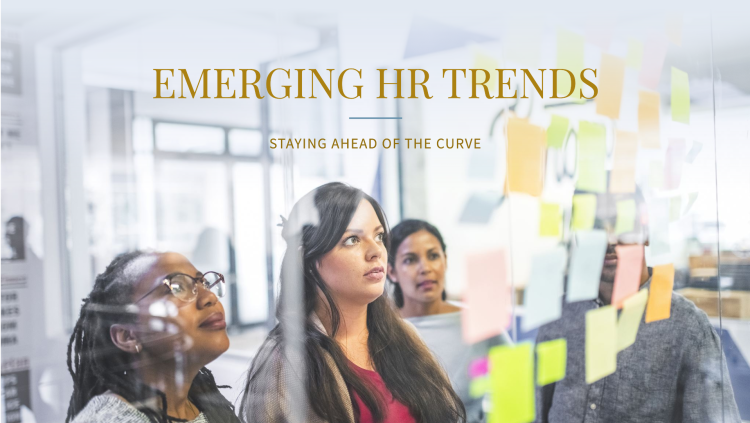Staying Ahead of the Curve: Emerging Trends in HR
- Andrea Lucky

- Oct 21, 2024
- 3 min read

Introduction
The field of Human Resources is constantly evolving, driven by technological advancements, changing workforce dynamics, and new business challenges. Staying ahead of these trends is essential for HR professionals who want to lead their organizations into the future. In this newsletter, we’ll explore some of the most significant emerging trends in HR and provide insights on how to leverage them to drive organizational success.
The Importance of Staying Current with HR Trends
Keeping up with emerging HR trends allows organizations to remain competitive, attract and retain top talent, and create a positive workplace culture. By understanding and adapting to these trends, HR professionals can implement innovative strategies that enhance employee engagement, improve productivity, and support overall business goals.
Emerging Trends in HR
1. Artificial Intelligence and Automation
AI and automation are transforming HR processes, from recruitment and onboarding to performance management and employee engagement. AI-powered tools can streamline administrative tasks, provide data-driven insights, and enhance decision-making. Embracing AI and automation can lead to greater efficiency and more strategic HR functions.
2. Remote and Hybrid Work Models
The shift to remote and hybrid work models has become a permanent fixture in many organizations. HR professionals must develop policies and practices that support flexible work arrangements, ensure effective communication, and maintain employee engagement. Investing in technology and fostering a culture of trust are key to successful remote and hybrid work environments.
3. Employee Well-being and Mental Health
Employee well-being and mental health have become top priorities for organizations. Providing comprehensive wellness programs, mental health resources, and support systems is essential for fostering a healthy and productive workforce. HR professionals should focus on creating a culture that prioritizes well-being and reduces stigma around mental health issues.
4. Diversity, Equity, and Inclusion (DEI)
DEI initiatives are critical for building a diverse and inclusive workplace. Organizations are increasingly focusing on creating equitable opportunities, addressing unconscious bias, and fostering a sense of belonging. HR professionals must lead DEI efforts by implementing inclusive policies, providing training, and measuring progress.
5. Data-Driven HR
The use of data analytics in HR is growing, enabling organizations to make informed decisions based on real-time insights. HR analytics can help identify trends, predict future workforce needs, and measure the impact of HR initiatives. Leveraging data-driven approaches allows HR to align strategies with business goals and demonstrate value.
6. Continuous Learning and Development
Continuous learning is essential for keeping employees’ skills up-to-date and fostering a culture of innovation. Organizations are investing in learning and development programs that offer personalized learning paths, microlearning, and on-demand training. HR professionals should focus on creating opportunities for continuous growth and development.
7. Employee Experience and Engagement
Enhancing the employee experience is crucial for attracting and retaining talent. Organizations are focusing on creating positive, meaningful experiences throughout the employee lifecycle, from recruitment to offboarding. HR professionals should prioritize employee engagement by soliciting feedback, recognizing achievements, and fostering a supportive work environment.
8. Agile HR Practices
Agile HR practices involve adopting flexible, iterative approaches to HR processes and initiatives. This includes using agile methodologies for project management, embracing continuous feedback loops, and being responsive to changing business needs. Agile HR practices can enhance adaptability and drive innovation.
Conclusion
Staying ahead of emerging HR trends is essential for driving organizational success and creating a positive workplace culture. By embracing AI and automation, supporting remote and hybrid work models, prioritizing employee well-being, leading DEI initiatives, leveraging data-driven HR, promoting continuous learning, enhancing employee experience, and adopting agile HR practices, HR professionals can navigate the evolving landscape and position their organizations for future success. Remember, staying current with HR trends not only benefits employees but also strengthens the overall organization.




Comments